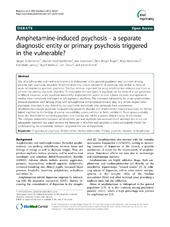Amphetamine-induced psychosis - a separate diagnostic entity or primary psychosis triggered in the vulnerable?
Bramness, Jørgen G.; Gundersen, Øystein H.; Guterstam, Joar; Rognli, Eline B.; Konstenius, Maija; Løberg, Else-Marie; Medhus, Sigrid; Tanum, Lars; Franck, Johan
Peer reviewed, Journal article
Published version
Permanent lenke
https://hdl.handle.net/1956/6656Utgivelsesdato
2012-12-05Metadata
Vis full innførselSamlinger
Originalversjon
https://doi.org/10.1186/1471-244x-12-221Sammendrag
Use of amphetamine and methamphetamine is widespread in the general population and common among patients with psychiatric disorders. Amphetamines may induce symptoms of psychosis very similar to those of acute schizophrenia spectrum psychosis. This has been an argument for using amphetamine-induced psychosis as a model for primary psychotic disorders. To distinguish the two types of psychosis on the basis of acute symptoms is difficult. However, acute psychosis induced by amphetamines seems to have a faster recovery and appears to resolve more completely compared to schizophrenic psychosis. The increased vulnerability for acute amphetamine induced psychosis seen among those with schizophrenia, schizotypal personality and, to a certain degree other psychiatric disorders, is also shared by non-psychiatric individuals who previously have experienced amphetamine-induced psychosis. Schizophrenia spectrum disorder and amphetamine-induced psychosis are further linked together by the finding of several susceptibility genes common to both conditions. These genes probably lower the threshold for becoming psychotic and increase the risk for a poorer clinical course of the disease. The complex relationship between amphetamine use and psychosis has received much attention but is still not adequately explored. Our paper reviews the literature in this field and proposes a stress-vulnerability model for understanding the relationship between amphetamine use and psychosis.

